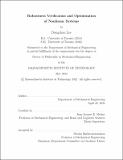Robustness Verification and Optimization of Nonlinear Systems
Author(s)
Lee, Dongchan
DownloadThesis PDF (5.471Mb)
Advisor
Slotine, Jean-Jacques E.
Terms of use
Metadata
Show full item recordAbstract
Nonlinear systems allow us to describe and analyze physical and virtual systems, including dynamical systems, power grids, robots, and neural networks. The problems involving nonlinearity pose challenges in providing safety guarantees and robustness in the presence of uncertainty. This thesis provides methods to exploit knowledge on upper and lower bounds on the nonlinearity and solves problems related to robustness verification and optimization subject to uncertain parameters. The first half of the thesis develops the convex restriction of a non-convex feasibility set defined by a set of nonlinear equality and inequality constraints. Convex restrictions provide a closed-form convex quadratic condition that is sufficient for solving a system of nonlinear equations. By replacing the original constraints with the proposed conditions, a non-convex optimization problem can be solved as a sequence of convex optimization problems, with feasibility and robustness guarantees. We demonstrate its applications in Model Predictive Control (MPC), robustness verification of neural networks, robust Optimal Power Flow (OPF) problem, and motion planning in robotics. The second part of the thesis focuses on nonlinear dynamical systems and develops reachability analysis and constrained-input constrained-output analysis for verification problems. We provide an optimization-based method for computing reachable sets around a nominal trajectory. The proposed methods use contraction metrics to find templates for reachable sets. Additionally, we developed constrained-input constrained-output analysis to characterize the relationship between peak magnitudes of input and output signals. Numerical experiments were conducted to demonstrate their applicability to a broad class of nonlinear systems.
Date issued
2022-05Department
Massachusetts Institute of Technology. Department of Mechanical EngineeringPublisher
Massachusetts Institute of Technology